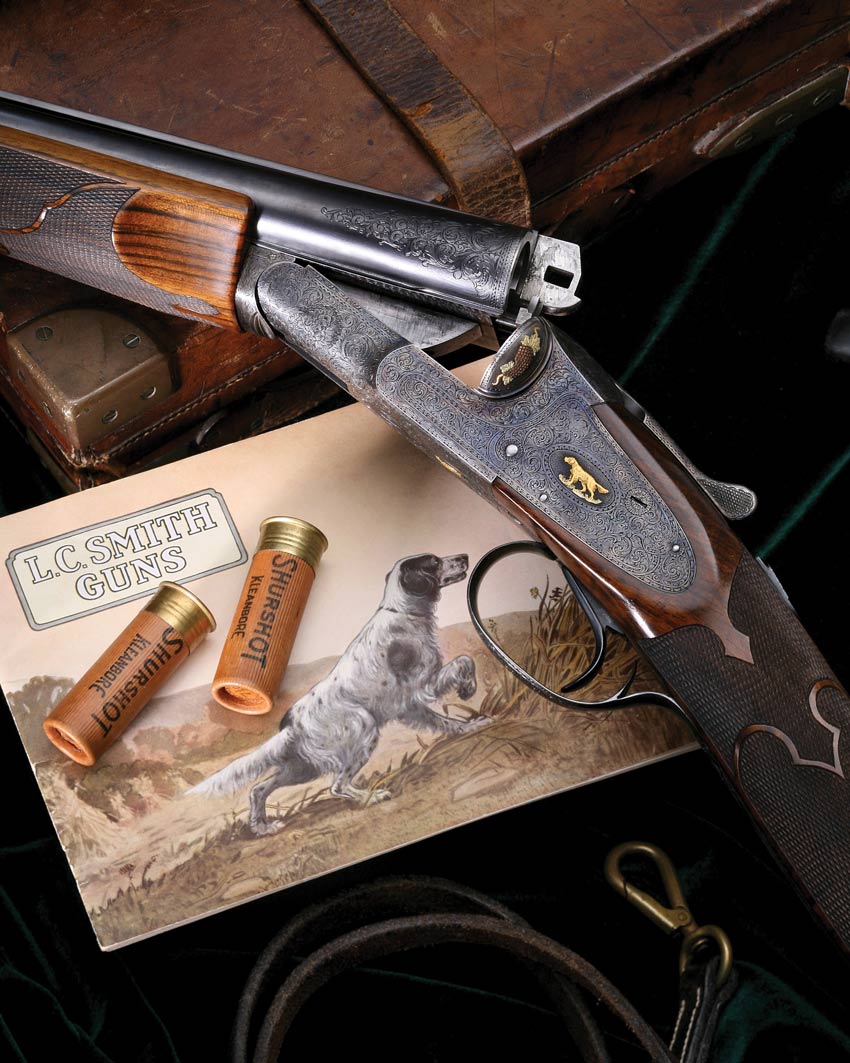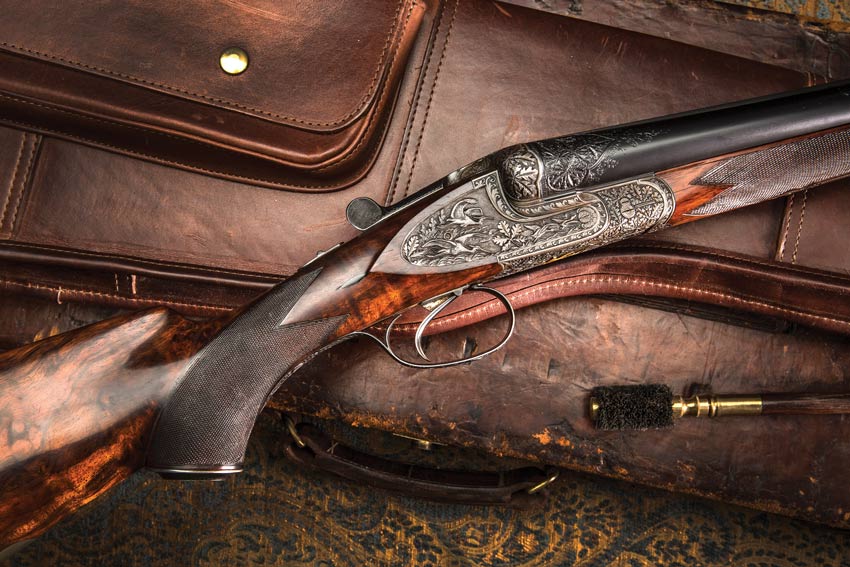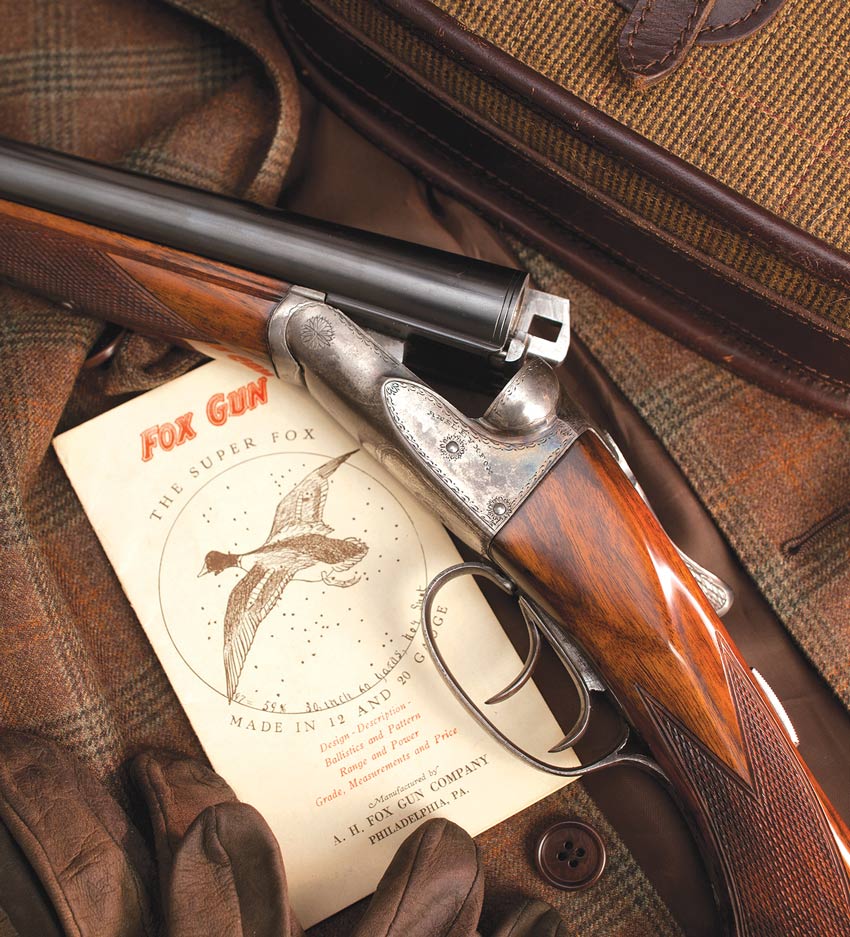The challenge of valuing shotguns
By Dwight Van Brunt
Photographs by Terry Allen
It had been a near-perfect morning in the pheasant fields. The dogs had put on quite a show, the sun had kissed our shoulders and few shots had gone wide. Our thrown-together group was bunched up in the mudroom kicking off wet boots and balancing steaming cups of coffee. The conversation jumped from the healthy bird numbers we had seen to the spectacular shots we had made—and our partners had missed. By the time we stormed the breakfast table, talk had turned to guns.
One of the older gentlemen was describing some of the nicer pieces in his collection when he paused for a second and said, “Yeah, I’ve been lucky to acquire a fair number of guns through the years, but in all honesty, it’s gotten to the point where I really don’t need them all anymore. I don’t shoot as much as I used to, and these days a lot of my guns just sit in the safe. The trouble is I don’t know what to do with them. My kids aren’t interested in hunting, and should something happen to me, I don’t want my wife to have to deal with everything.
“Problem is, I have no idea what the best way is to sell them or maybe even donate them—let alone figure out what they’re worth. It never occurred to me that owning a bunch of guns would create its own problem.”
This didn’t surprise me, as I hear it all the time. As the population ages, an increasing number of shooters are considering disposing of their guns—or at least most of their guns—rather than pass the responsibility to someone else. Of course, the idea of doing so can be overwhelming, not only because of the emotions involved but also because of the unknowns regarding how to do things the right way.
As the owner of Sportsman’s Legacy, a firm dedicated to assisting individuals and organizations monetize firearms as well as sporting collectibles, wildlife art and books, I have helped a good number of sportsmen and collectors navigate the process of marketing their sporting items—and achieve proper value for them. My pointers and suggestions regarding shotguns in particular come from almost 40 years’ experience.
When it comes to shotguns, all ships don’t rise with the tide.

When it comes to selling firearms, I’ll never forget the words of wisdom I received from an insufferable dealer—we’ll call him Mike, because that was his real name—who I shared a table with at a gun show back in 1982. Amidst all of his insufferable stories and useless advice, Mike dropped a single, amazing pearl: “Let me tell you the two most important rules to making money on guns. Handguns are easier to sell than rifles, and rifles are easier to sell than shotguns. More importantly, handguns and rifles are a whole lot easier to price than shotguns.”
By “price,” Mike meant to accurately value, but you get the drift. Whatever else he might have droned on about that miserable day, I’ve never heard a greater gun-related truth than his observation regarding the challenges of properly valuing shotguns.
Think of it this way: The buying process for a used handgun or rifle is similar to that employed for a used car. Within the predetermined confines of requirements and budget, one considers availability, compares features, evaluates condition and then makes the best possible decision. Therefore, it stands to reason that the process for accurately valuing something with a rifled bore reflects these same criteria.
Shopping for a used shotgun is akin to searching for used clothing. If a shotgun doesn’t fit, then it almost certainly won’t perform as well as one might hope, no matter how good the deal. Therefore, neverminding the odd exceptions, an accurate shotgun valuation must consider dimensions every bit as much as features, condition and all the other factors generally associated with firearms. To further complicate the process, shotguns have a far greater number of critical dimensions than handguns and rifles, and some shotgun features can be rather nuanced. Proper valuation for a shotgun—or at least a fine shotgun—can be something of an art form.
Starting at the lower end, many common shotguns are best described as having a “utility value.” They are tools that can be used and enjoyed by just about anyone who knows which way to orient the pointy end. Most pumps, semi-automatics and inexpensive or altered doubles fit this description, and the world is full of examples that serve as meaningful comparables. Prices for common shotguns are also rather stable, so the likelihood of significant value changes year-over-year is slim.
Most above-average and nearly all exceptional firearms do not have an exact value. Rather, they occupy a value range, if for no other reason than condition is somewhat subjective. Therefore, the purpose of the valuation process actually centers on narrowing a value range as much as possible.
Why does an accurate valuation matter? Insurance is a primary reason, especially if the focus is obtaining replacement coverage for something unique or difficult to replace. In this case, a written valuation signed by a qualified professional is often required before coverage is granted. Obtaining this documentation is usually quick, painless and generally self-directed. In other cases—and certainly those where values of individual guns are five or six figures—a second valuation or even a report by a certified appraiser may be required.
When the primary purpose of determining the value of a shotgun is related to estate planning or philanthropy, the appraisal process becomes formal. As far as the IRS is concerned, there is no substitute for an appraisal report. A note on Billy’s Great Guns letterhead signed by Billy himself in blood and sealed with his world-famous tobacco-juice watermark is not and will never be an appraisal report. I simply encourage you to discuss this with your tax professional and heed his or her advice. A final caution: Just because someone you know “got away with” writing off a $50,000 scattergun by donating it to a nonprofit organization without proper tax documentation backed by an appraisal report does not mean that you will.
For all that, the most common reason to establish a proper value for a shotgun revolves around either acquisition or disposition. In most cases the best place to begin researching is by consulting the Blue Book of Gun Values (bluebookofgunvalues.com). Spending a few minutes in those pages generally provides an accurate value range for most shotguns. An online-subscription option speeds things along and offers more images and updates throughout the year.
With the Blue Book number in mind, the next step is to review both current and sold listings on websites like gunbroker.com and gunsinternational.com. If the valuation range aligns across the board, you will know you’re on the right track. For values above $5,000, I strongly recommend checking past results at a national firearms auction house like Morphy Auctions (morphyauctions.com) or Rock Island Auction Company (rockislandauction.com). Finally, visit with trusted individuals and dealers who regularly participate in the proper market segment.
No matter how careful your research, it doesn’t mean anything if you aren’t honest regarding features, dimensions and original condition. A Superposed with 26½" barrels differs in value significantly from another with 28" tubes. A Parker with an added recoil pad is worth a whole bunch less than it would have been if the dog’s-head buttplate were present. An average Winchester Model 12 in 12 gauge offered for a few hundred dollars won’t turn a head, while another in 28 gauge will snap necks even if priced in the low thousands.
Whether you elect to call it refinishing, refurbishing or restoration, it is impossible to overstate the importance of correct evaluation of any distancing from original condition. Arguments over this topic are legendary, but most agree that a significantly greater penalty applies to an American-made shotgun than one with London or Birmingham on its rib.
Another thing when it comes to shotguns is that all ships don’t rise with the tide. Some brands, or at least models, are worth less in real dollars than they were when I began trading in 1982. Once-preferred features have fallen out of favor over time, while others have enthusiastically caught fire. When I got started, for example, a 16-gauge was worth about 30 percent less than a 12, all things being equal. Clearly this is no longer the case.
General economics and related sentiments, supply and demand, consumer confidence, seasonality, location, trends, demographics, ammunition development, media exposure, accessories, marketing and advertising always have played a role in determining a shotgun’s value—or at least how quickly it will sell at a particular price. Chances are pretty good they always will. Dealers who specialize in this market follow these trends on a continual basis and can be a valuable source of information.

In my mind, the most important reason to determine the true value of any firearm is to protect your estate and loved ones. Quite likely you know more about your guns than anyone, so recording that information among your estate-planning documents is critical. I always recommend that my clients take two important and immediate steps. First, legally record the appointment of someone you trust to act as the “gun executor” for your estate and direct him or her to take action according to your formally directed wishes immediately upon a triggering event (e.g., significant cognitive decline, transition to an assisted-living environment or death). Why the urgency? Because as often happens with cash and jewelry, firearms are some of the first things to “go missing” once you aren’t there to take care of them. Second, develop some sort of living document that records all the important, historical and meaningful information about each firearm and annually update its valuation estimate. Together, these actions will dramatically increase the likelihood that your estate realizes the full monetary potential of each and every one of your firearms.
As for those guns you opt to dispose of ahead of time, it is obviously important that you receive fair value, whether you are selling the guns outright or donating them to a charitable organization. By taking your time, doing your homework and consulting competent and knowledgeable sources, you can successfully determine the true market values of your firearms.
Best Ways to Divest
When it comes to divesting oneself of firearms, whether through selling or philanthropy, every situation is unique. There are, however, several practical options that almost always rise to the top—these to be adopted as a single course of action or in some combination.
Charitable donations: For those financially able and so inclined to do so, donating firearms and hunting-related items to nonprofit organizations is a meaningful way to give back to something that has provided a lifetime of enjoyment. Many conservation organizations have someone who facilitates donations, and some even allow the donor to direct proceeds to a specific area within their mission, such as habitat enhancement or youth education.
DIY sales: Opting to sell guns through Internet sites or other classified-ad mediums can and does work, but it also is labor intensive and involves inherent risks. Not only will you need to be able to write accurate descriptions of your guns and take quality photos of them, but you also will need to be familiar with the legal requirements of shipping and how to deal with payment.
The local dealer: For firearms with values less than $1,000, consigning (not selling) to a local dealer simplifies logistics. Dealers generally will consign at 15% to 20%, and if they agree to your established values, sales are likely to happen sooner or later. Get receipts and establish firm prices (for either gross sales or net proceeds), to eliminate the burden of fielding offers. Doing so forces the dealer to stand firm and realize full value. It is reasonable to review the consignment every 90 days, if for no other reason than to make the dealer think about your items. At the time of renewal, don’t permit any discussion of a price reduction.

The local auction house: As with local dealers, firearms with values less than $1,000—and especially those in low condition—often do better at local auctions. However, many local auction houses don’t know the first thing about firearms. How to tell? If an auction house is serious about selling firearms, it will have its own FFL. It also will be able to show you previous listings with quality photos and comprehensive descriptions.
The “big middle”: Firearms with values from $1,000 to $2,500 sometimes can be properly monetized through local dealers or local auction houses as well. To make this determination, ask potential sellers to review their current inventory and discuss recent sales. As an aside, commission rates at local dealers and auction houses often are negotiable, especially for larger collections or more expensive items.
National specialty dealers: There are two or three dozen specialty firearms dealers that deserve consideration. In fact, several of them more or less specialize in fine shotguns. Scattered about the country, these are the places—along with national and regional auction houses—that sell the vast majority of fine firearms valued north of the low thousands. They are independent, extremely professional and very knowledgeable. Some operate solely on the Internet, and some maintain storefronts as well. They can assist with logistics, and they have people on staff who can respond to any question or need. Some offer advance payments or will purchase an entire collection outright; however, consignment is almost always the best option.
National and regional auction houses: As with national dealers, there are a handful of national auction houses that specialize in high-end firearms and several regional houses that might, depending on the mix of your collection, offer an even better choice. What I’ve observed is that the big national houses seem to generate the best returns for firearms in the five or six figures, while the regionals can do as well or better for items in the lower-to-mid thousands. All of these firms have professionals you can contact for detailed discussions and assistance with estate planning. Some offer the option of advanced partial payment upon receipt and can eliminate logistical challenges via direct pickup and transport. It can be prudent to ask for and then check referrals as well.
In summary, the best plan of action for divesting of guns may incorporate one or possibly several of the above options. A little research and advance planning can make a tremendous difference in the monetary results, to say nothing of your peace of mind. —D.V.B.






thanks great article and good advice.